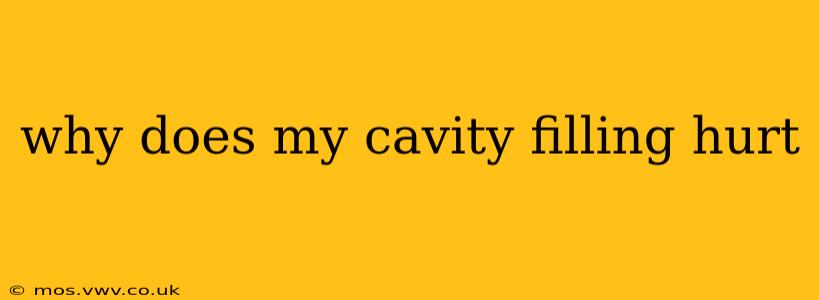A newly placed cavity filling shouldn't cause prolonged or severe pain. While some minor sensitivity is normal in the days following the procedure, persistent or intense pain warrants a call to your dentist. Let's explore the common reasons why a filling might hurt and what you can do about it.
What Causes Post-Filling Sensitivity?
Several factors can contribute to discomfort after a filling:
-
Irritation of the tooth: The filling process itself can irritate the tooth's nerve, leading to temporary sensitivity to temperature (hot and cold) and pressure. This is usually mild and subsides within a few days.
-
High filling: If the filling is placed too high, it can put pressure on your teeth when you bite down, causing pain or discomfort.
-
Infection: In some cases, an infection might be present beneath the filling. This is less common if the dentist thoroughly cleaned the cavity before placing the filling, but it's a possibility that should be ruled out.
-
Fractured tooth: Sometimes, a tooth might have a small fracture that wasn't initially detected, and the filling procedure might exacerbate the problem, leading to pain.
-
Sinus infection: Upper molar fillings may sometimes cause pain that feels like a toothache, but it’s actually related to a sinus infection. This is due to the proximity of the sinuses to the upper molars.
How Long Should Post-Filling Sensitivity Last?
Minor sensitivity, such as brief tingling or discomfort when consuming hot or cold foods, is generally expected to resolve within a few days to a week. However, if the sensitivity persists for longer, increases in intensity, or is accompanied by other symptoms like swelling or throbbing pain, it's crucial to seek professional dental care immediately.
What Should I Do If My Filling Hurts?
If you experience significant or persistent pain after a filling, don't delay contacting your dentist. They can:
-
Examine the filling: The dentist will visually check the filling to ensure it's properly seated and not causing undue pressure.
-
Take X-rays: X-rays can help rule out underlying issues like fractures or infections.
-
Adjust the filling: If the filling is too high, they can easily adjust it to relieve pressure and eliminate discomfort.
-
Prescribe medication: In cases of infection or significant pain, your dentist might prescribe pain relievers or antibiotics.
Is it Normal to Have Some Discomfort After a Filling?
Yes, it's perfectly normal to have some mild discomfort or sensitivity immediately after a filling. This is usually due to the temporary irritation of the tooth's nerve. However, it's the persistence and intensity of the pain that should raise concerns.
When Should I See a Dentist for Filling Pain?
You should schedule an appointment with your dentist if:
- The pain is severe or throbbing.
- The pain lasts for more than a week.
- You experience swelling around the tooth.
- You have difficulty biting down.
- You notice any other unusual symptoms.
Can a Filling Cause Long-Term Pain?
Generally, a well-placed filling shouldn't cause long-term pain. If you experience chronic pain associated with a filling, it's essential to have it examined to rule out other dental problems. The underlying cause might be something entirely different than the filling itself.
By understanding the potential causes of post-filling pain and promptly seeking professional attention when necessary, you can ensure your oral health and alleviate any discomfort. Remember, your dentist is the best resource for diagnosing and treating any issues related to your dental work.
